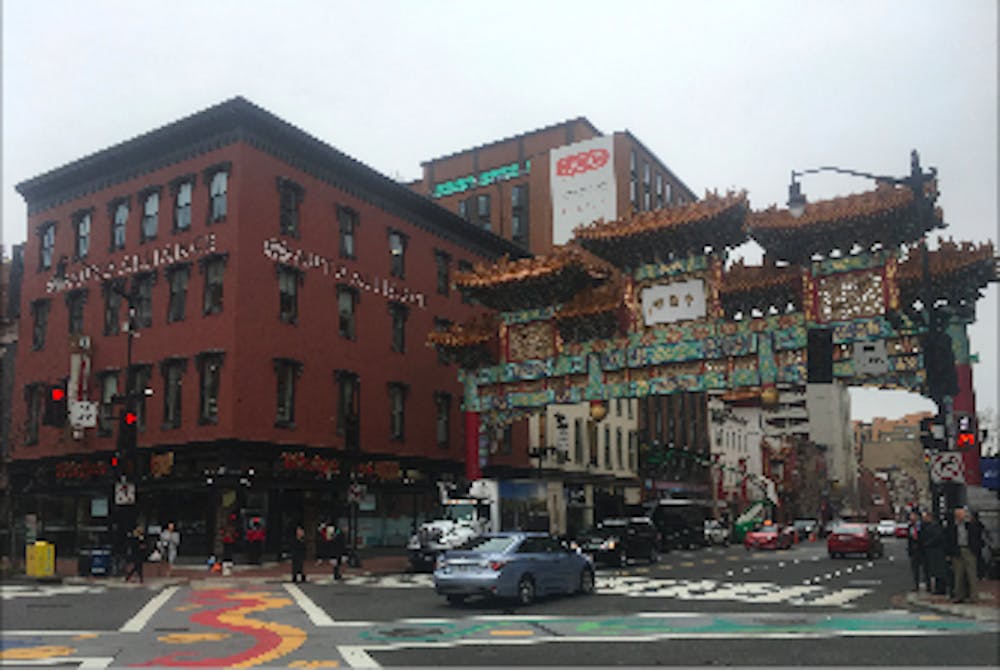Last summer, while looking for a free bike on Craigslist, one thing led to another, and I ended up working part-time at a Chinese restaurant in D.C.'s Chinatown. Since then, people have asked me what I did there, and I can't really say.
I did some cooking, some cleaning, some serving, some advertising and a lot of cursing in Chinese. I'd go to my internship during the day and then go to the restaurant in the evening to put on an apron and serve bowls of noodles to an endless stream of hipsters, Chinese tourists and federal employees.
I ended up learning about how restaurants are run, how to cook some dishes, and I learned some stuff about Chinese-American identity.
"We aren't a Chinese restaurant; We are an Asian fusion restaurant. Get it right."
The restaurant boss is in his late 20s and opened this restaurant last May. He adamantly claims that he does not run a Chinese restaurant. Why? Because according to him, "Chinese restaurants" are shoddy takeout places where people order a $5.95 greasy pork lo mein and a pu pu platter at 11 p.m. while stoned.
These restaurants completely ruined the reputation of Chinese food according to Americans, and as a result, our entire cuisine (and culture) is looked down upon as cheap calories to deliver MSG to taste buds.
We are supposed to be an "Asian fusion" restaurant. "Asian fusion" is the new yuppie brand that is used to attract all the younger middle class customers to drop an unnecessary amount of money for a dish that typically adds teriyaki and Sriracha to something banal like a salad. How novel.
These are the people the boss tries to cater to, because they are quick to spend money and enjoy writing self-aggrandizing food reviews to share with their buddies.

But the thing is, we sell a lot of Chinese food, the full spectrum of it. We have dishes ranging from General Tso's Chicken to trick white people to a Nanjing saltwater duck that Chinese natives say tastes like it does back home.
The dumplings in the restaurant are made the same way as my parents make them on our countertops. I would know, because I've been up until 1 a.m. folding dumplings with a bunch of old Chinese people in a stuffy kitchen. The head chef got his training at a culinary school in China and has a passion for Chinese food that far surpasses my own. We sold Chinese food, and it was good Chinese food. I wouldn't have worked there if that were not the case.
It is ridiculous that we rejected this "Chinese restaurant" label. The restaurant really had the potential to stress its authenticity as a selling point. Given its resources, the restaurant could have campaigned to redefine Chinese food as a cuisine with a rich history rooted in delicate and diverse flavors.
Jumping on the "Asian fusion" hype train without making an honest attempt at fusion is a waste of what assets the restaurant actually had. And having an authentic Chinese restaurant in D.C. Chinatown would be a significant improvement to the neighborhood.
"Oh my god, D.C. Chinatown is so fake. If you want real Chinese food you have to go somewhere else."
Hi Yelp review lady. I'm sorry that our restaurant's food cannot account for the legacy of demographical shifts and gentrification in the neighborhood. Your complaint that D.C. Chinatown has become a hub of corporatized franchises is perfectly valid, but it is ridiculous to believe that the presence of a Walgreens and a Hooters next door is lowering the quality of our food. However, I do understand your disdain for the neighborhood.

The first time I visited D.C.'s Chinatown was upsetting. I was looking for an Asian supermarket to buy cheap soy sauce in bulk, and I couldn't find one.
Instead, I encountered a Dunkin Donuts, a McDonalds, a Chipotle and a Verizon Wireless Arena. Adding insult to injury, all of these businesses had some ridiculous Chinese slogan underneath their logo, because the city wishes to preserve the "cultural heritage" of the neighborhood for tourist and entertainment purposes.
Therefore, D.C.'s Office of Planning requires all businesses in the area zoned as "Chinatown" to have Chinese characters and signage. That's why it says "best hamburger in the world" in Chinese underneath the Fuddruckers sign. Though I'm sure Fuddruckers and Hooters are fine establishments, masquerading them as Chinatown businesses is laughable at best.
Following the 1968 riots, many Chinese families in D.C.'s Chinatown left to move to the suburbs of Maryland and Virginia. The population of Chinese Americans fell from a high of 3000 to 300 residents today with many of them facing pressure to vacate by building developers. It's become a Chinatown without any Chinese people and very few Chinese businesses.
This past summer, I thought about what it means to be authentic to my heritage. The restaurant dismissed its Chinese identity to chase prevailing trends. The neighborhood embraced being Chinese without a drop of Chinese blood to back it up. In both of these cases, people shed authenticity for a profit.
While I understand that people want to make money, there are surely ways to do that without this whole demeaning charade.
Surely, there must be a way to sell Chinese food in a Chinatown that is Chinese.
As a disclaimer, I still work for the restaurant by managing website stuff, so I didn't include its name, since this isn't meant to be a promotional piece. If you do end up somewhere that sounds like this restaurant and want a suggestion for a dish, go for the signature bowl. It's a solid choice.


















Please note All comments are eligible for publication in The News-Letter.